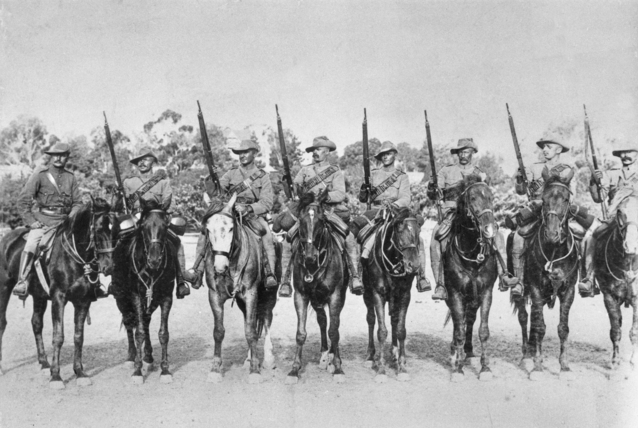Where do Australian interests stop?
Posted By Nic Stuart on September 2, 2014 @ 12:30
 [1]As dawn broke on 1 January 1901, the splendidly-attired band of the Royal New South Wales Lancers was busy polishing its kit (including the new kettle-drums to be carried on a beautiful white Clydesdale draft-horse). The regiment would soon provide a ceremonial guard for Lord Hopetoun, our first Governor-General, as he travelled in state to Centennial Park. There, he’d soon proclaim Australia a nation. A couple of hours later, as the sun rose in South Africa, other Lancers were also rising for duty. But the troopers there weren’t preparing for parades—they were too busy fighting the Boers.
[1]As dawn broke on 1 January 1901, the splendidly-attired band of the Royal New South Wales Lancers was busy polishing its kit (including the new kettle-drums to be carried on a beautiful white Clydesdale draft-horse). The regiment would soon provide a ceremonial guard for Lord Hopetoun, our first Governor-General, as he travelled in state to Centennial Park. There, he’d soon proclaim Australia a nation. A couple of hours later, as the sun rose in South Africa, other Lancers were also rising for duty. But the troopers there weren’t preparing for parades—they were too busy fighting the Boers.
Before the turn of the new century, a squadron of volunteers had paid their own way to travel to England and train with the Dragoon Guards. Those soldiers were on their way back to Australia when the ship docked at Capetown. Between the troopers’ leaving London and arriving in South Africa, the Empire had declared war on the Boers. But as the ship docked on 2 November 1889 a telegram [2] from the NSW Premier, Sir William Lyne, was rushed aboard.
There’d been a major political debate back in Sydney. Many believed if the Empire was at war, NSW was too. They insisted the squadron should disembark and fight. Others, including many conservatives, felt the quarrel between the free Dutch settlers (who’d left the Empire to win and establish their own land) and the English settlers of the Cape was none of Australia’s business.
Seventy-two Lancers ignored the strong hints of their government to return. Instead, they disembarked from the SS Nineveh and went off to fight the Boers, becoming the first volunteers from the Empire to do so. When its hand was forced by the cavalrymen the state parliament back in Sydney supported their action. Later, thousands of Australians would join the small band and serve in South Africa.
For these soldiers, and their supporters back at home, the idea that interests ended at the watery boundary of the continent was ridiculous. For them there was no question: if the Empire was deploying troops, Australia would be there. Others insisted there was a choice and what was needed was careful consideration before force was deployed abroad. It lingers today.
The argument’s become the touchstone of an issue that’s continued to bedevil our country’s military commitments ever since: what, exactly, are Australia’s interests and where should we fight? If everyone could agree what those concerns actually are, there’d be no requirement for any Parliamentary debates—ever. Yet ironically, it’s exactly the need for genuine debate and argument that ensures no government is ever likely to allow them to take place. No Prime Minister ever wants to risk having their judgement overturned as happened in the past.
After all, the country voted ‘no’, emphatically and decisively, not just once but twice when asked if conscription should be introduced during WWI. Twenty years later Prime Minister John Curtin (who’d previously opposed the issue) vacillated before finally bowing to his American master. Douglas Macarthur, wanted the diggers for mopping up tasks, including a fight in Borneo (although definitely not in the Philippines). Even at the time this was declared ‘an unnecessary war [3]’. The later small deployments of professional soldiers to Borneo and Korea didn’t provoke much outrage back in Australia, although the subsequent contribution to Vietnam left deep and continuing scars [4].
And today? The political reality is, quite simply, that politicians from the main political parties have no desire to see any genuine debate take place.
Canberra will never host debates like those in the Athenian agora [5], as that city-state agonised over whether to send an expedition to invade Sicily. At first the assembly voted to send just 60 ships to Italy, a small commitment the state could afford. Then Nicias, an opponent of the expedition, outlined the real dangers that the troops would face. He hoped to convince everyone to scuttle the expedition. Instead the Athenians decided to double down. They sent over 100 triremes, embarking on an intervention that would result in Athens’ eventual defeat and subjugation to Sparta.
Thucydides didn’t believe in the wisdom of crowds and neither has any Australian government, Labor or Liberal since World War I. The politicians are determined to retain the ability to make war in their own hands. For operational reasons (and because of a disjunction between dawn in Iraq and Question Time in Canberra) John Howard didn’t, in fact, even inform Parliament before SAS boots were on the ground invading Iraq in 2003.
The reality is no government will ever again be prepared to allow real and genuine debate to occur before declaring war. It forces the Government to make a case and sometimes that can be quite difficult. It opens a Pandora’s box. No, the actual decision to use military force remains one of the few prerogatives PMs have left. There’s no way they’ll ever hand it over to others.
Nic Stuart is a columnist with The Canberra Times. Image courtesy of Australian War Memorial [6].
Article printed from The Strategist: https://aspistrategist.ru
URL to article: /where-do-australian-interests-stop/
URLs in this post:
[1] Image: https://aspistrategist.ru/wp-content/uploads/2014/09/Screen-Shot-2014-09-02-at-12.08.22-pm.png
[2] a telegram: http://www.lancers.org.au/site/South_Afica.asp
[3] an unnecessary war: https://aspistrategist.ru/australian-strategy-and-the-unnecessary-war/
[4] deep and continuing scars: http://australianinvolvementinvietnam.wikispaces.com/Homefront
[5] those in the Athenian agora: http://www.perseus.tufts.edu/hopper/text?doc=Thuc.+toc&redirect=true
[6] Australian War Memorial: http://www.awm.gov.au/collection/P00220.001
Click here to print.